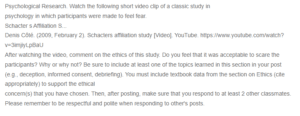Discussion – Deception, Informed Consent and Debriefing
I believe that it was acceptable to scare the participants. Deception entails intentionally misleading experiment participants so as to sustain the experiment’s integrity (Spielman et al. 60). However, this should not be done to the point that it is deemed harmful. Deception might undermine informed consent and cause psychological distress, as observed in Schacter’s affiliation study. However, deception was necessary in this study to maintain the study’s integrity. It can be said that there was a careful balance between the potential benefits of the study and the potential harm that the scarce stimuli could cause. Schacter had to make use of deception to be able to obtain clear results on individuals’ need for affiliation. Without the use of deception, this purpose might not have been achieved.
Subsequently, debriefing is considered important once the study is completed. This involves providing complete and honest information regarding the experiment’s purpose, how the data will be used, the reasons behind the deception, and how to gather additional information regarding the study (Spielman et al. 60). Given that Schacter’s study involved potential distress, as can be seen from the participants’ reaction once they were told they would not be electrically shocked, debriefing was considered of great importance. In Schacter’s study, debriefing was done, enabling the participants to understand the true nature of the study. By debriefing the participants, the researcher eliminated or reduced the possibility of any psychological harm that participants could have. The relief the participants had after being debriefed shows that there were no major damages caused to participants following the deception that was used in the experiment. Generally, I believe that the study conducted by Schacter was ethical.
Works Cited
Spielman, Rose., Williams, Jenkins., & Marilyn Lovett. Psychology 2e. Openstax. 2020.
ORDER A PLAGIARISM-FREE PAPER HERE
We’ll write everything from scratch
Question

Deception, Informed Consent and Debriefing
Psychological Research. Watch the following short video clip of a classic study in
psychology in which participants were made to feel fear.
Schacter’s Affiliation S…
Denis Côté. (2009, February 2). Schacters affiliation study [Video]. YouTube. https://www.youtube.com/watch?v=3imjiyLpBaU
After watching the video, comment on the ethics of this study. Do you feel that it was acceptable to scare the participants? Why or why not? Be sure to include at least one of the topics learned in this section in your post (e.g., deception, informed consent, debriefing). You must include textbook data from the section on Ethics (cite
appropriately) to support the ethical
concern(s) that you have chosen. Then, after posting, make sure that you respond to at least 2 other classmates. Please remember to be respectful and polite when responding to other’s posts.

